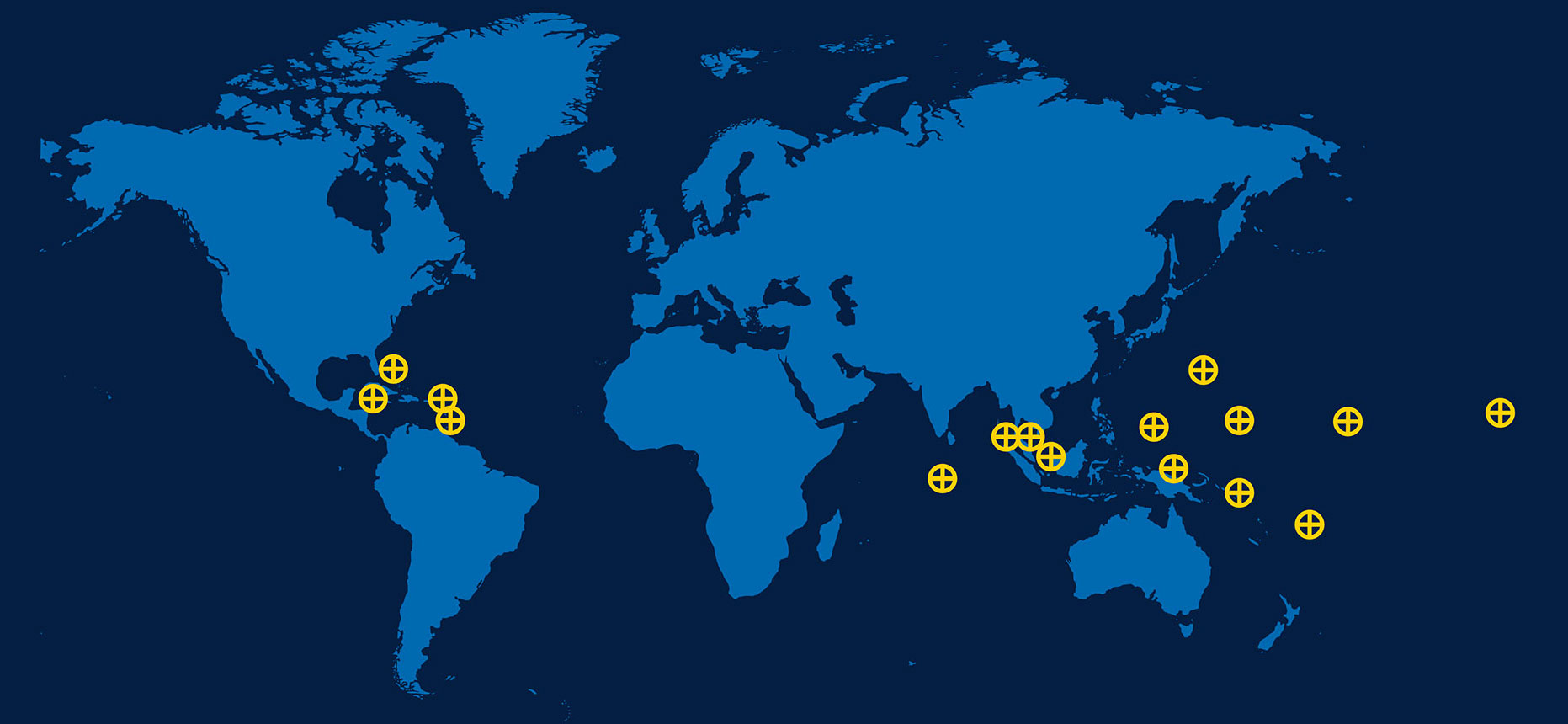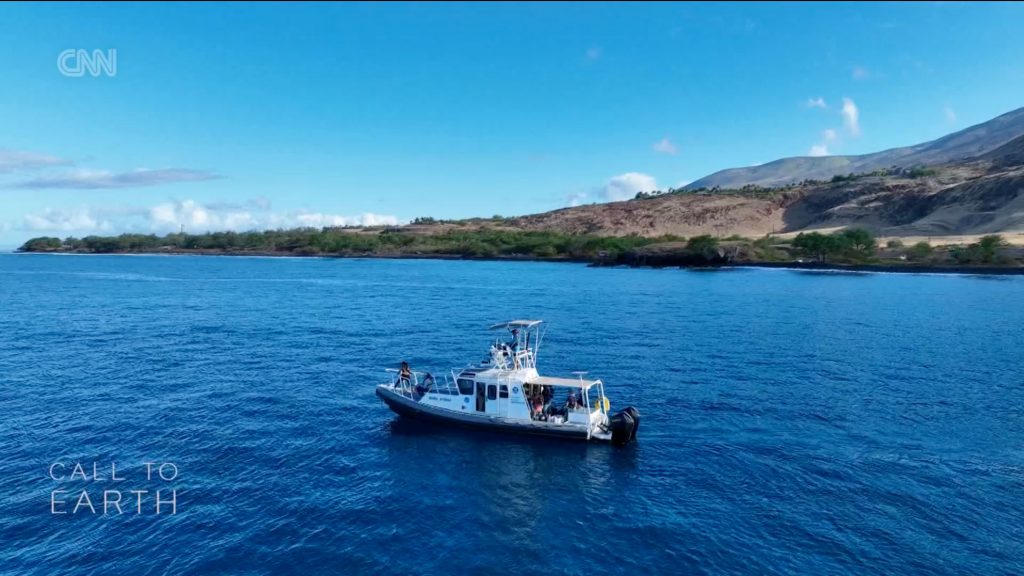Science + Innovation to Save Coral Reefs
Our team is tackling the coral reef crisis with every tool in its Toolkit.
Taking Action
Half the world’s coral reefs have disappeared in the last 70 years—and the rest could be gone by 2100 if we don’t take action
Developing Solutions
We're working to rebuild reefs and improve coral resilience—before it’s too late.
Diagnostics & Intervention
Since 2021, we’ve applied our Toolkit to reefs in the US Virgin Islands—and now we're taking it around the world!
Robotics
- Map coral cover + condition
- Collect biodiversity + invasive species data
- Early warning system for bleaching
Bioacoustics
- Attract coral larvae
- Sound-based health diagnostics
- Understand fisheries+ ecosystem health
Advanced Diagnostics
- Monitor coral health
- Determine water quality
- Examine chemical + microbial signs of stress
Hydrodynamics
- Map currents + temperature
- Predict coral larval transport + settlement
- Model + forecast environmental changes
- Identify + prioritize restoration sites
Health Interventions
- Coral probiotics
- Vitamin supplements
- Metabolomics to diagnose+ treat disease
Reef Solutions Around the World
We’re bringing our research from the US Virgin Islands to vulnerable reefs around the world.
Mouse over to find out where we’re going next– and how we’re working with partners to give reefs a chance.

 Little Cayman
Little Cayman
Little Cayman
Status: Relatively high coral cover, but recently declining due to bleaching and Stony Coral Tissue Loss Disease
Partners: Central Caribbean Marine Institute (CCMI)
Reef Solutions: Advanced Diagnostics, Health Interventions + Hydrodynamics, Acoustics
- Testing how reef sites impact coral microbiomes + coral health
- Aiding coral larvae recruitment with sounds of a healthy reef
- High-resolution hydrodynamic modeling to target interventions
- Training new scientific divers to administer Reef Solutions
 Maui
Maui
Maui, Hawaii
Status: Declining coral cover and increasing prevalence of disease
Partners: Maui Ocean Center, The Nature Conservancy, NOAA Humpback Whale National Marine Sanctuary
Reef Solutions: Bioacoustics + Interventions
- Aiding coral larvae recruitment with sounds of a healthy reef
- Quantifying substrates that can support new coral growth
 Bahamas
Bahamas
Bahamas
Status: Severely damaged by hurricanes, coral bleaching, coastal development, and diseases like Stony Coral Tissue Loss Disease. Overfishing and pollution are accelerating shifts toward algal-dominated communities
Partners: not yet identified
Reef Solutions: Advanced Diagnostics
- Testing water quality
- Assessing reef health through chemical and microbial analysis
 St. John
St. John
St. John, U.S. Virgin Islands
Status: Protected from development but declining due to disease and bleaching
Partners: University of Virgin Islands, National Park Service, Caribbean Oceanic Restoration and Education Foundation (CORE)
Reef Solutions: Health Interventions, Robotics, Bioacoustics, Advanced Diagnostics
- Promoting disease resistance with nutrient + beneficial biofilms
- Biodiversity mapping + soundscapes with advanced robotics
- Aiding coral larvae recruitment with sounds of a healthy reef
- Advanced water quality monitoring
 Antigua
Antigua
Antigua
Status: Drastic losses in coral cover, especially endangered elkhorn corals; increased accumulation of sargassum (macroalgae); increasing coastal development
Partners: Elkhorn Marine Conservancy
Reef Solutions: Advanced Diagnostics + Restoration
- Advanced water quality testing of reefs, nurseries, and restoration sites
- Reviewing coral planting strategies to enhance reef restoration success
 Dominica
Dominica
Dominica
Status: Impacted by sedimentation, pollution, and fishing, which has resulted in declines in coral cover and fish diversity
Partners: Oceans Forward Dominica
Reef Solutions: Scaling Solutions
- Adapting more user-friendly research tools
- Training partners to use reef monitoring tools
 Solomon Islands
Solomon Islands
Solomon Islands
Status: Healthy reef, with high coral cover and diversity
Partners: Ocean Exploration Trust, R/V Nautilus, National Geographic Society
Reef Solutions: Advanced Diagnostics
- Creating baseline for a reef health index
 Papau New Guinea
Papau New Guinea
Papau New Guinea
Status: Healthy and renowned for its biodiversity
Partners : Not yet identified
Reef Solutions: Advanced Diagnostics
- Creating baseline for a reef health index
 Fiji
Fiji
Fiji
Status:
Partners: Not yet identified
Reef Solutions: Advanced Diagnostics
- Creating baseline for a reef health index
 Marshall Islands
Marshall Islands
Marshall Islands
Status: In recovery, following years of nuclear testing. High biodiversity reefs.
Partners: Not yet identified
Reef Solutions: Advanced Diagnostics
- Creating baseline for a reef health index
 Micronesia
Micronesia
Micronesia
Status: Healthy + highly diverse, offering an opportunity to explore the connections between diversity and coral health
Partners: Not yet identified
Reef Solutions: Advanced Diagnostics
- Creating baseline for a reef health index
 Palua
Palua
Palau
Status :
Partners : Not yet identified
Reef Solutions: Advanced Diagnostics
- Creating baseline for a reef health index
 Nicobar
Nicobar
Nicobar Island
Status: High diversity coral reefs.
Partners: In development
Reef Solutions: Advanced Diagnostics
- Creating baseline for a reef health index
 Malaysia
Malaysia
Malaysia
Status: High diversity coral reefs
Partners: Wee Cheah, University of Malaysia
Reef Solutions: Advanced Diagnostics
- Creating baseline for a reef health index
 Chagos
Chagos
Chagos Archipelago
Status: High diversity coral reefs
Partners: Not yet identified.
Reef Solutions: Advanced Diagnostics
- Creating baseline for a reef health index
 N Mariana Islands
N Mariana Islands
Northern Mariana Islands
Status: Healthy
Partners: Not yet identified
Reef Solutions: Advanced Diagnostics:
- Creating baseline for a reef health index


“If coral reefs are going to survive, they need people to understand the problems, science to develop solutions, and technology to scale up the solutions to reach all reefs. We’re implementing a plan to help corals in crisis– and with your support, give reefs a chance.”
Amy Apprill
WHOI Microbial Ecologist
Lead, Reef Solutions Initiative
Reef Solutions Top Stories
Underwater ‘reef music’ could help in coral restoration
Few ecosystems are struggling more than coral reefs. They’re facing a variety of threats like warmer temperatures, pollution and overfishing….


